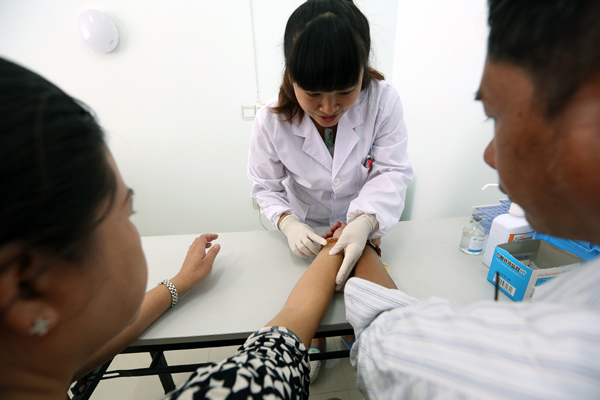Clinic on frontier of AIDS care
Updated: 2014-07-10 10:09
By Shan Juan (China Daily)
|
|||||||||||
|
 Myanmar-based patients in financial difficulties receive free medical treatment in Ruili.[Photo by Jiang Dong / China Daily] |
Education
Yu Caifeng heads a local NGO called Ruikangyuan, which has partnered with the CDC on a program of AIDS intervention aimed exclusively at Myanmar prostitutes in Ruili. In her view, education is key to combating the spread of the disease.
"Educating the clients works better than simply informing the prostitutes," Yu said at her office, where racks of playing cards, videos, games and Myanmar fashion magazines give the impression of a playroom. The amenities are a way of encouraging prostitutes to use the services available.
Feng Hua (not her real name), a 19-year-old from Myanmar, said she planned to watch a movie after her "training session". She followed Yu's movements diligently, repeatedly pulling out a condom, squeezing the air out of the tip, and capping it on a plastic model.
Feng receives an average of 10 clients a day, charging them 50 yuan each. "I try my best to make them wear a condom because I don't want to get infected," she said.
The HIV surveillance team estimates that Ruili has a transient population of about 200 prostitutes from Myanmar, 1.6 percent of whom have HIV, a relatively high rate of incidence, said Li Zhoulin, who added that most of the clients are Chinese.
Yu noted that most of the sex workers are in their 20s, come from poor families, and usually sell sex for three to six months in Ruili.
The prostitutes are regularly contacted by outreach workers who provide tips on preventing the spread of the disease, distribute free condoms, and conduct checkups for HIV and other sexually transmitted diseases. However, most of the women prefer to be treated in Myanmar and "we help with their referral," Yu said.
Feng was concerned because the AIDS clinic in Muse, run by the charity Medecins Sans Frontieres has stopped accepting patients, citing a shortage of drugs and limited treatment capacity.
The only exceptions are children and pregnant women, said Sanjay, who heads the clinic, which treats 1,700 patients, including 40 Chinese. "No ID is required for treatment, and patients are given code numbers to protect their identities."
Sanjay called for a further escalation of cooperation between the two countries - to ensure that a larger number of patients in the border areas receive timely treatment - and for better patient management. He noted that a new phenomenon has emerged, where some patients are receiving free drugs from both sides of the border, and suggested that a special body be established in Ruili to care for patients from Myanmar.
Li, of the Ruili CDC, endorsed the suggestion, and said he was confident the spread of the disease could be slowed via increased cross-border cooperation. However, he said China's efforts to treat patients from Myanmar are makeshift, because sooner or later most of them will be transferred to their home country for treatment.
"This is recognized by the health authorities on both sides, and accords with the wishes of most of the patients," he said. "However, these people need assistance right now, and that's our main consideration."
Contact the author at shanjuan@chinadaily.com.cn
Today's Top News
Van Gaal: I taught Romero how to stop penalties
Israel steps up offensive, 53 die
UN chief calls for political horizon
For Brazil fans, a debacle worse than 1950
Tesla faces suit over trademark
Rich eye overseas game hunting
E-commerce giants go rural
Scolari apologizes for Brazil's World Cup failure
Hot Topics
Lunar probe , China growth forecasts, Emission rules get tougher, China seen through 'colored lens', International board,
Editor's Picks

|

|

|

|

|

|





